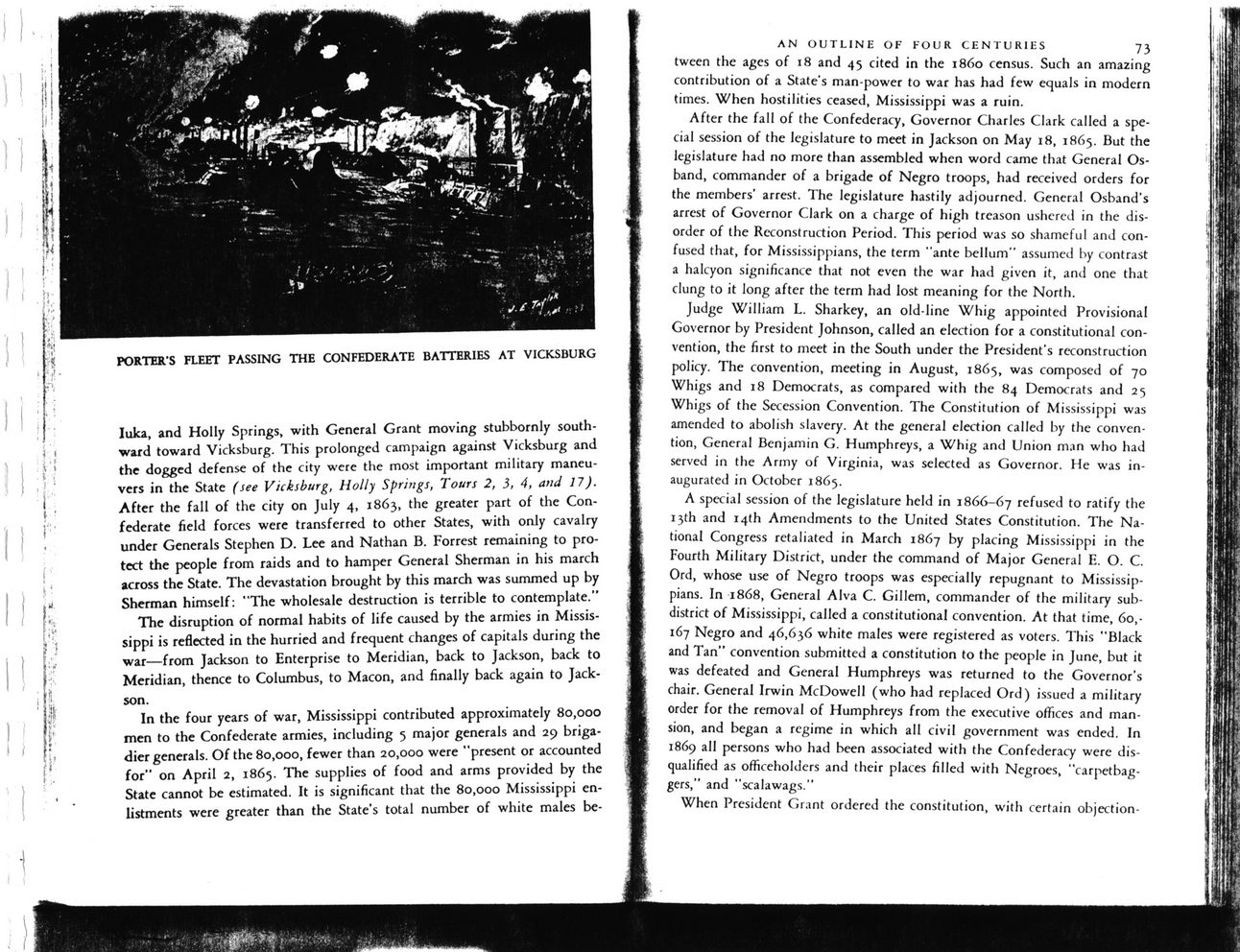This text was obtained via automated optical character recognition.
It has not been edited and may therefore contain several errors.
PORTER’S FLEET PASSING THE CONFEDERATE BATTERIES AT VICKSBURG Iuka, and Holly Springs, with General Grant moving stubbornly southward toward Vicksburg. This prolonged campaign against Vicksburg and the dogged defense of the city were the most important military maneuvers in the State (see Vicksburg, Holly Springs, Tours 2, 3, 4, and 17). After the fall of the city on July 4, 1863, the greater part of the Confederate field forces were transferred to other States, with only cavalry under Generals Stephen D. Lee and Nathan B. Forrest remaining to protect the people from raids and to hamper General Sherman in his march across the State. The devastation brought by this march was summed up by Sherman himself: "The wholesale destruction is terrible to contemplate.” The disruption of normal habits of life caused by the armies in Mississippi is reflected in the hurried and frequent changes of capitals during the war—from Jackson to Enterprise to Meridian, back to Jackson, back to Meridian, thence to Columbus, to Macon, and finally back again to Jackson. In the four years of war, Mississippi contributed approximately 80,000 men to the Confederate armies, including 5 major generals and 29 brigadier generals. Of the8o,ooo, fewer than 20,000 were "present or accounted for” on April 2, 1865. The supplies of food and arms provided by the State cannot be estimated. It is significant that the 80,000 Mississippi enlistments were greater than the State’s total number of white males be- AN OUTLINE OF FOUR CENTURIES 73 tween the ages of 18 and 45 cited in the i860 census. Such an amazing contribution of a State's man-power to war has had few equals in modern times. When hostilities ceased, Mississippi was a ruin. After the fall of the Confederacy, Governor Charles Clark called a special session of the legislature to meet in Jackson on May 18, 1865. But the legislature had no more than assembled when word came that General Os-band, commander of a brigade of Negro troops, had received orders for the members’ arrest. The legislature hastily adjourned. General Osband’s arrest of Governor Clark on a charge of high treason ushered in the disorder of the Reconstruction Period. This period was so shameful and confused that, for Mississippians, the term "ante bellum" assumed by contrast a halcyon significance that not even the war had given it, and one that clung to it long after the term had lost meaning for the North. Judge William L. Sharkey, an old-line Whig appointed Provisional Governor by President Johnson, called an election for a constitutional convention, the first to meet in the South under the President's reconstruction policy. The convention, meeting in August, 1865, was composed of 70 Whigs and 18 Democrats, as compared with the 84 Democrats and 25 Whigs of the Secession Convention. The Constitution of Mississippi was amended to abolish slavery. At the general election called by the convention, General Benjamin G. Humphreys, a Whig and Union man who had served in the Army of Virginia, was selected as Governor. He was inaugurated in October 1865. A special session of the legislature held in 1866-67 refused to ratify the 13th and 14th Amendments to the United States Constitution. The National Congress retaliated in March 1867 by placing Mississippi in the Fourth Military District, under the command of Major General E. O. C. Ord, whose use of Negro troops was especially repugnant to Mississippians. In 1868, General Alva C. Gillem, commander of the military subdistrict of Mississippi, called a constitutional convention. At that time, 6o,-167 Negro and 46,636 white males were registered as voters. This "Black and Tan” convention submitted a constitution to the people in June, but it was defeated and General Humphreys was returned to the Governor’s chair. General Irwin McDowell (who had replaced Ord) issued a military order for the removal of Humphreys from the executive offices and mansion, and began a regime in which all civil government was ended. In 1869 all persons who had been associated with the Confederacy were disqualified as officeholders and their places filled with Negroes, "carpetbaggers,” and "scalawags.” When President Grant ordered the constitution, with certain objection-

Hancock County Early WPA-Guide-to-Mississippi-(050)